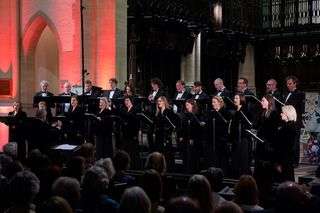|
Back
A welcome return visit Toronto
Metropolitan United CHurch
11/17/2018 -
Eriks Esenvalds: Stars – A Drop in the Ocean
Omar Daniel: Soduri Ema
Sergei Rachmaninov: All Night Vigil, op. 37: I, III, V, VI, VIII, XIV, & XV
Gabriel Dharmoo: Futile Spells (I, II, III & VI)
Santa Ratniece: Chu Dal
Tālivaldis Kenins: Alleluia
Anders Hillborg: Mouyayoum
Peteris Vaskas: The Tomtit’s Message
The Latvia Radio Choir, Sigvards Klava (conductor) 
(© Claire Harvie)
This was the third time Soundstreams has presented this 24-member (six each SATB) choir. Aside from the group’s uncanny musical abilities, the outstanding feature of the program was just how little was sung in Latvian, despite the fact that the current tour celebrates the centennial of Latvian independence.
The program opened with Stars by Eriks Esenvalds to a poem by American poet Sara Teasdale. The sense of wonder that one feels when looking up at the night sky was evoked by legato layers of vocalism enhanced by the other-worldly sound of water glasses being rubbed – a DIY glass harmonica. Esenvalds’ other work, A Drop in the Ocean, has three literary sources: the Latin Pater noster, and two saints: Francis of Assisi and Mother Teresa (both in English). The work has a mix of singing and chanting as well as the water glass effect again, though much more subtle.
Omar Daniel is a Canadian composer of Estonian origin and his Soduri Ema (“Soldier’s Mother”) is set to poems by Marie Under (1883-1980), whose lengthy life witnessed dramatic (or cataclysmic) changes in her country’s history. In the three stanzas the mother is apprehensive as her son leaves home. The work has halting pauses, and passages for solo voices. Significantly, it was commissioned by Soundstreams (with help from the Canada Council) for performance by the Estonian Philharmonic Chamber Choir. It requires a crack ensemble like this one to do it justice.
The first half ended with eight sections from Sergei Rachmaninoff’s landmark All-night Vigil. “Organic” is the best descriptor for this, with sensuous shading throughout, while maintaining a hypnotic steadfastness. A large church (seating about 2000) might seem a large space for such a small choir, but their supple sound was felt to full advantage.
The second half featured two works in no language at all. The first was a work by Gabriel Dharmoo, a 37-year-old Canadian, who during the concert received the Canadian Music Centre’s Harry Freedman Recording Award, named for the prolific Polish-born Freedman (1922-2005). His Futile Spells (we heard just parts I, II, III and VI, about 10 minutes in all) presents an array of effects, with swooshing sounds, foot-stomping, some jolly bits, chattering, humming, and high-to-low voice juxtapositions. It was greeted with a kind of bemused puzzlement. More successful was Swedish composer Anders Hillborg’s Mouyayoum, composed in 1983. The program notes use the term “sonic weave” to describe its blend of phonetic sounds. It bears a resemblance to the microtonal works of, say, Ligeti. It builds in a haunting way, with vibrating whistling sounds in the mix.
Separating the two non-verbal works were (1) Santa Radniece’s Chu Dal, to a Tibetan text, a successful evocation of the arrival of spring on a Tibetan Lake; and Tālivaldis Kenins’ Alleluia. Kenins (1919-2008) was born in Estonia and, after education in France, came to Canada in 1951 where he became an influential part of Toronto’s burgeoning music scene. His Alleluia, composed in 1981, treats the word in various ways, sometimes solemn, rapturous, playful soaring – everything but Handelian or triumphalist. (Arguably a precursor to Leonard Cohen’s sleeper hit?)
The final work on the program, after pieces in English, Latin, Estonian, Russian, Tibetan and Made-up, was sung in Latvian: Pēteris Vasks’ The Tomtit’s Message, to a poem by Uldis Bērzins. The title sound faintly comical in English (one thinks of The Mikado), but in Latvian folklore the small bird is the bearer of messages, some of them ominous. The poem has just nine lines but has a density of references, with cryptic hints of a drama that, supported by expressive vocalism, is fleshed out to a surprising degree.
There was one encore, a lively, sunny piece with a title that translates as “I was born to sing”. If it is this choir’s theme song, it’s a perfect one.
Michael Johnson
|